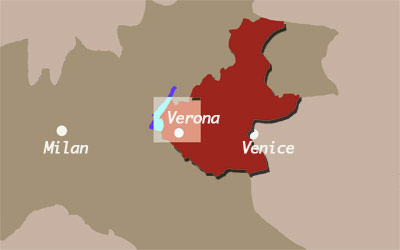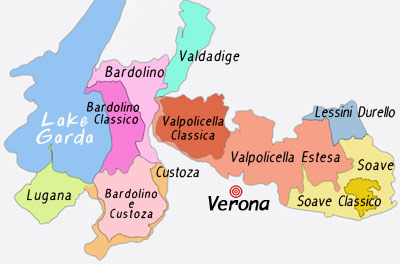Italy wine history and Verona

In order to better understand the wines of Verona and how they are deeply rooted to its territory and to the millenary tradition of wine making in Italy, it could be interesting to go through the history of wine and wine making.
For further information:
+39 333 2199 645 info@veronissima.com P.I. 03616420232 C.F. CPPMHL74L13L781C
As Greek culture spread throughout Europe, wine and vine growing were introduced to several of the new Greek colonies. Among these there was a neighboring land that the Greeks called Enotria. The word means "Land of wine". The name was given because the vines thrived wherever they were planted there, and it was the source of the best wines produced around the Mediterranean sea. Spreading wine to this land was important because a fledging culture soon started there that had a love of wine from the beginning. Enotria today is Italy and the fledging culture eventually became the most important ancient civilization in Europe: Rome.
Rome and Wine Making
No other ancient culture was more important to the advancement of wine's quality and the spread of it. The Romans made several advancements in both grape growing and wine making, first of all a full scale selective breeding of wine grape vines, many of which are the ancestors of grapes still grown in Italy and all over the world nowadays. Roman wine makers were probably the first to understand the importance of terroir, identifying different areas of quality growth and matching specific grape varieties to their ideal growing conditions.
This is one of the main reasons why Italy has more native grape varieties then any other country in the world, each with its own characteristics, developed in thousands of years of growing in a specific territory.
Considering how different is Italian territory, stretching from north to south with mountains, islands, sea coast, lakes, African and continental climates, it should not be surprising that there are more then 350 different authocthonous wine grape varietals.
Verona Wines

Not surprisingly, Verona, with the important role it had in Roman age, has a very old tradition in vine growing and wine making. In a letter of the 5th Century, Cassiodorus, minister of Theodoric the Great, the barbaric king of the Osthrogots who made his kingdom in Italy and Verona one of its capital, recommend the king to try the sweet wine produced in the territory around Verona. In prizing the exellence of the wine he also explained how the wine, both in a white and red version, was made with grapes left to dry until winter before being squeezed. After more then 1600 years, in Valpolicella and Soave similar wines are still made by drying grapes for four months after harvest: the Recioto of Valpolicella and the Recioto of Soave. A recent research that sequenced the genes of the most important grape varietal used in the making of Valpolicella wines, the Corvina, discovered how the drying process of the grapes is not just a simple dehydration but is a definitely more complex process, activating more than 415 genes that controls the metabolism of the grapes and activate the production of secondary flavours and aromas typical of the Recioto and Amarone. Many of these genes can be also found in other grape varieties such as Pinot Noir, but they remain inactive while in Corvina they are perfectly functioning and activate during the drying, helping completing the ripening and developing the typical aromatic complexity of the Amarone.
The same grape varietal, Corvina, grown in different terroirs gives completely different wines, for example the light and fruity Bardolino produced only few kilometers from Valpolicella. This means that Corvina is a grape varietals that has been selected to perfectly adapt growing conditions and the wine making techniques typical of Valpolicella territory over thousands of years. The name Valpolicella in fact comes from Latin: Vallis Polis Cellae, valley of the many cellars, testifying the old wine making tradition of Verona territory. Corvina is only one of the many grape varieties typical of the territory of Verona: Rondinella, Molinara, Oseletta, Croatina, Pelara, Garganega, and many other. They've been carefully preserved in spite of the popularity of easily recognizable international grape varieties. Verona proudly resisted the so called "Cabernetization" of its vineyards and according to the great success that Verona wines are experiencing all over the world it was the right choice.
Classica Vs Extend Wine Produng Areas
Verona wines are so popular that in order to meet the increasing demand of the market, the traditional producing areas needed to be expanded around the original birthplace of their wines, in areas that for climate and soil composition can be considered similar to the original area. Today, producing areas are divided into Classica (classic, traditional) and extended. We have for example a Valpolicella Classica area and an Extended Valpolicella producing area. The wine produced in each area will be Valpolicella Classico and Valpolcella. The area of production must be reported on the label.
This doesn't mean that wines produced in the extended wine producing area are as good as those produced in the classica area. On the contrary, it often happens that producers of the extended area, in order to fill the gap image of their wines, end up producing even better wines than those produced in the Classica area. For example, an Amarone considered among the best, and of course one of the most expensive, is produced by a very famous winery in the extended Valpolicella area.
Wine Tours in Verona
Even if you are not a wine expert, a winery tour in Verona wine producing areas will be an unforgettable experience, allowing you to discover a millenary territory, full of history, culture, legends and of course excellent wines. Our experienced wine tourist guides will make your tour informative and fun designing a tour to perfectly suite your needs and wine knowledge.
For further information on Verona wines, winery tours in Verona wine production areas or to book a wine tasting tour:
Info & Bookings:
+39 333 2199 645 info@veronissima.com P.I. 03616420232 C.F. CPPMHL74L13L781C

 IT
IT 日本
日本 DE
DE FR
FR 中文
中文 ES
ES